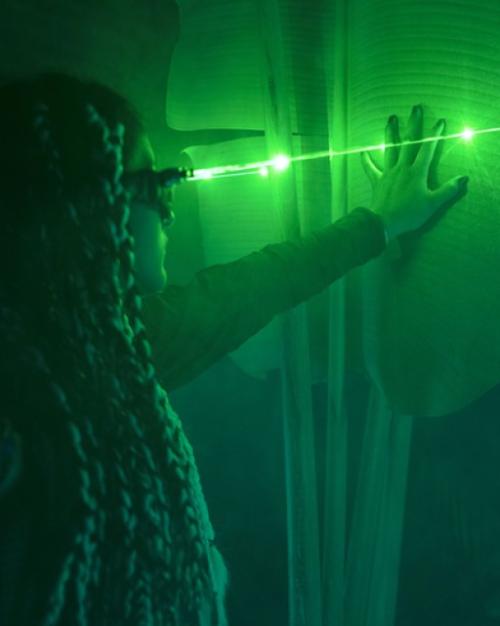Cornell Council for the Arts announces the fifth Cornell Biennial, featuring artworks, installations, and performances addressing the curatorial theme: “Futurities, Uncertain.” Curated by Timothy Murray, CCA Director and Professor of Comparative Literature and Literatures in English, the 2022 Cornell Biennial stages an artistic call and response to counter singular utopic models, colonial visions, and socio-cultural sameness.
“Particular to the ethos of the Cornell Biennial, is its commitment to blending experimentation in the arts with the most recent research developments across the disciplines and campuses of Cornell," Murray said. "The Biennial not only brings to campus a range of the most innovative projects in global arts but also champions how the inventive discourses of art can inform if not reshape how we understand social relations, ecological challenge, design recycling, engineering imaginaries, and biological response across the spectrum of research and pedagogy at Cornell.”
Imagining how artistic futurities might generate cultural transformation in its plenitude, an array of interdisciplinary artistic projects will animate the future differently. With funding from the Office of the Provost and multiple Cornell partners, Biennial projects will be displayed in rotation across the campus from April – November, with the bulk of exhibitions and performances to be staged in the fall.
22 invitational artists and collectives from 11 countries will join ten Cornell-based projects to address crucial questions regarding race and social justice, global warming, artistic representation, robotics, sustainable ecology and architecture, migration and labor. Invitational projects include:
- A lecture/performance on race and social justice by award-winning author Wendy S. Walters (M.F.A./Ph.D. in English 2000)
- A bioart installation generating the scent of labor by Buffalo-based artist Paul Vanouse
- An Arts Quad fabric sculpture in dialogue with the history of Goldwin Smith Hall by Filipinx-Canadian artist Sara Jimenez
- A Herbert F. Johnson Museum of Art sound sculpture and video and sound performance by Black sound artists Mendi and Keith Obadike
- A. D. White Professor-at-Large Xu Bing’s recreation of a shadow box facsimile of one of the Johnson Museum’s classical Chinese ink paintings
- An AI robotic installation by American artist Ken Feingold
- A series of video projections by many of the world’s leading screen artists and collectives: Karrabing Film Collective (Australia), Camel Collective (US/Mexico), Moon Kyungwon and Jeon Joonho (South Korea), Larissa Sansour and Søren Lind (Palestine/Denmark), Patricia Domínguez(Chile).
Wide-ranging Cornell based projects will forge futuristic intersections between art, social justice, biology, design, engineering and information science.
Inaugurating the 2022 Cornell Biennial will be two holdover projects from the 2020 Biennial, cancelled by COVID: Jenifer Wightman’s living sculpture of “mud painting” to be exhibited in Mann Library, from April 15 to November, and the “Libe Slope Wild Garden” of natural plantings by History graduate student, Matthew Dallos, which has been growing at the north end of Libe Slope since spring 2020.
These investigations of bioart will be followed in the fall by a project on recycling human waste by art major Matéa LeBeau (’22) and Plant Science major Isabella Culotta (’22). In the fall, a striking natural outdoor landscape installation by Landscape Architecture Assistant Professor Jennifer Birkeland and Jonathan A. Scelsa will summon Cornellians to imagine the solutions to ecological pressures threatening Cayuga Lake. And, led by faculty members Leslie Lok and Felix Heisel, two different massive wood installations by Cornell Architecture teams will display their research experimentations in a new economy of natural wood reuse, recycling and reconfiguration.
Rounding out the exhibitions will be a sound art installation by Assistant Professor of the Practice of Art, Joanna Malinowska and C. T. Jasper. Assistant Professor of PMA Juan Manuel Aldape Muñoz’s will stage a large-scale puppetry installation and parade of nine-banded armadillos, a creature with unpredictable migration patterns, to shine a light on the invisibility of indigenous migrant labor and the interconnectedness of climate change, indigeneity, and migration.
Addressing the uncertainty of pandemics, Associate Professor of Human Centered Design, So-Yeon Yoon, will mount a 3D data visualization of frontline workers during the COVID pandemic, while the Cornell Fashion + Textile Collection will pay tribute to those impacted by HIV/AIDS. Graduate student Esther Kondo Heller (MFA, Cornell Poetry ’23), will create a soundscape series and workshop dedicated to the complexity of poetry.
Two inaugural Biennial collaborations promise to extend the public outreach of “Futurities, Uncertain.” With funding from Mellon Collaborative Studies in Architecture, Urbanism, and the Humanities, the 2022 Biennial launches the “Mellon Public Curatorial Expression” program on race and social justice. Two collectives of Cornell graduate students were selected in competition to articulate Biennial projects in dialogue with their academic research. For “Stories Untold: From Patchwork to Justice,” a group from Human Centered Design and Anthropology, Dyese Matthews, Kat Roberts, Ami Tamakloe, and Jenine Hillaire, will exhibit works by six fabric artists from the US and Ghana. For “Between Nothingness and Infinity,” the collective from Africana Studies, Comparative Literature, and Romance Studies of Lauren Siegel, Sarah Then Bergh, Marie Lambert, Romain Pasquer, will feature performances and paintings by artists from South Africa and Brazil.
Also new for 2022 is an effort to extend the reach of the Cornell Biennial across Upstate New York. In collaboration with the Cornell Council for the Arts, Ithaca’s The Cherry Arts will sponsor a regional Upstate art competition, “Local Futurities,” to be mounted in its new exhibition space in the Arthaus Building.
Taking the Biennial downstate, Cornell Tech will collaborate to exhibit two new NFT artworks by the prestigious Chinese artists Zhang Huang and Sui Jianguo. Cornell Urban and Regional Studies major Kellen Cooks (’23) will create a curriculum exploring how spatial imaginations produced by communities in their environment impact the socioeconomic structures and high school curriculum of his hometown of Ossining, New York.




